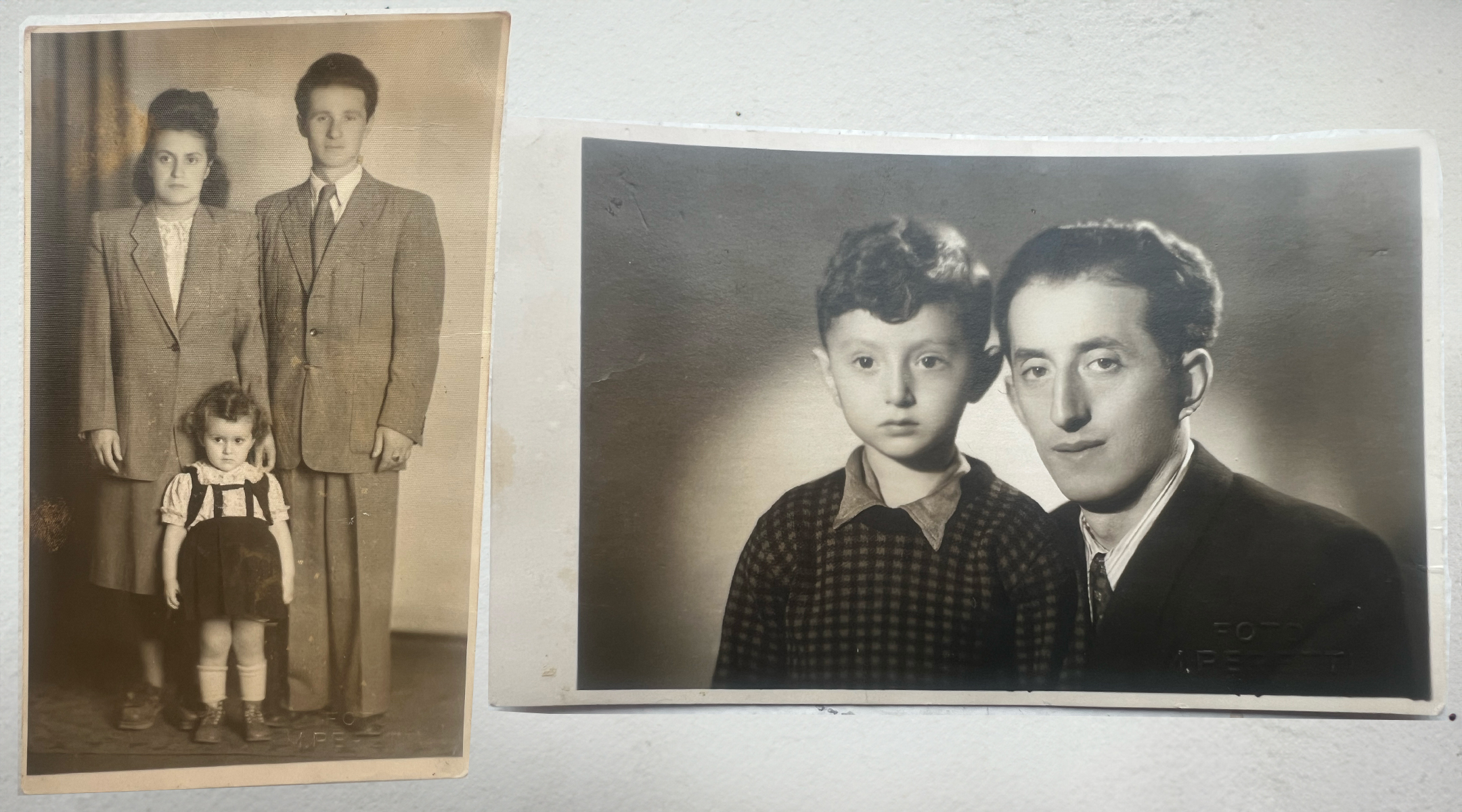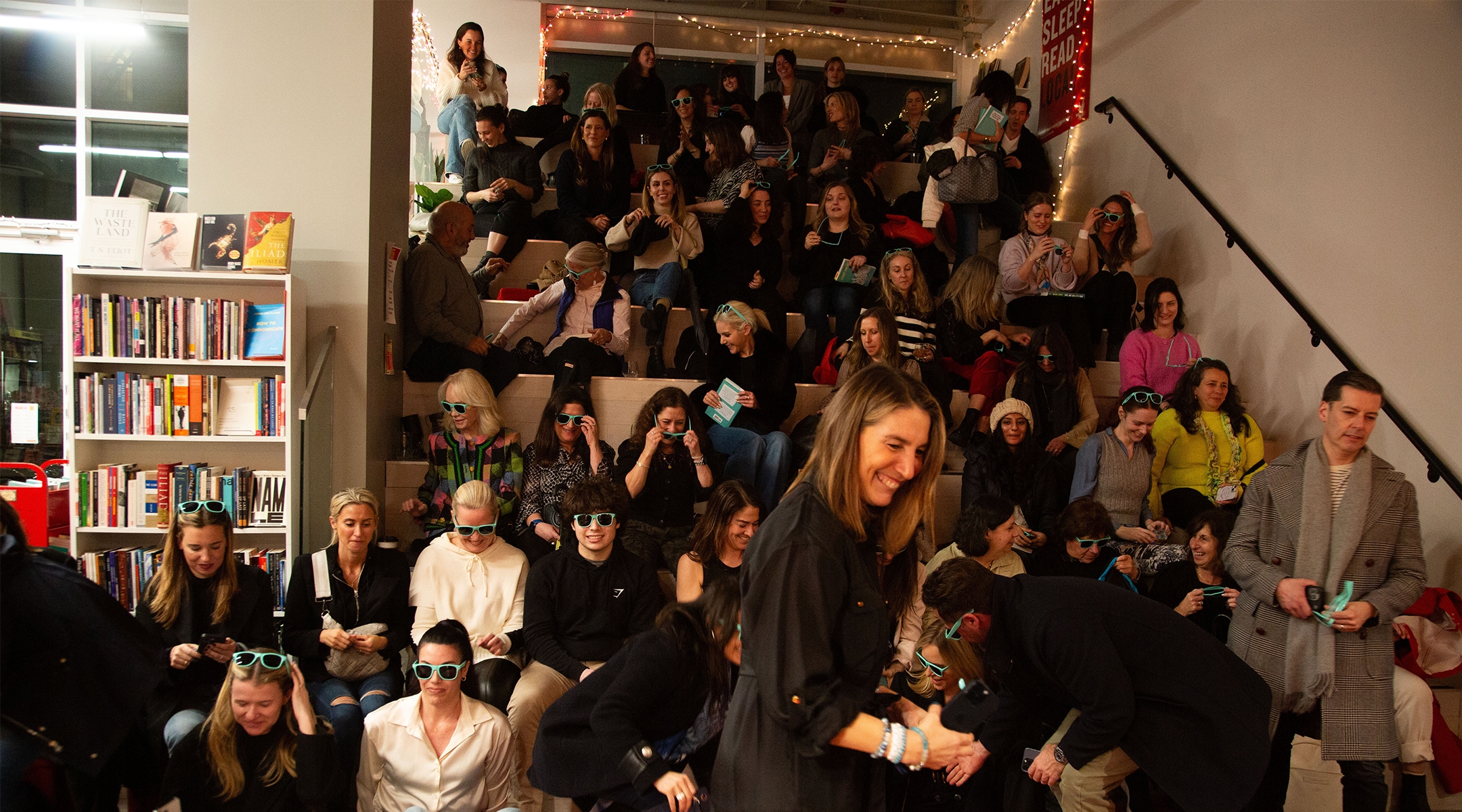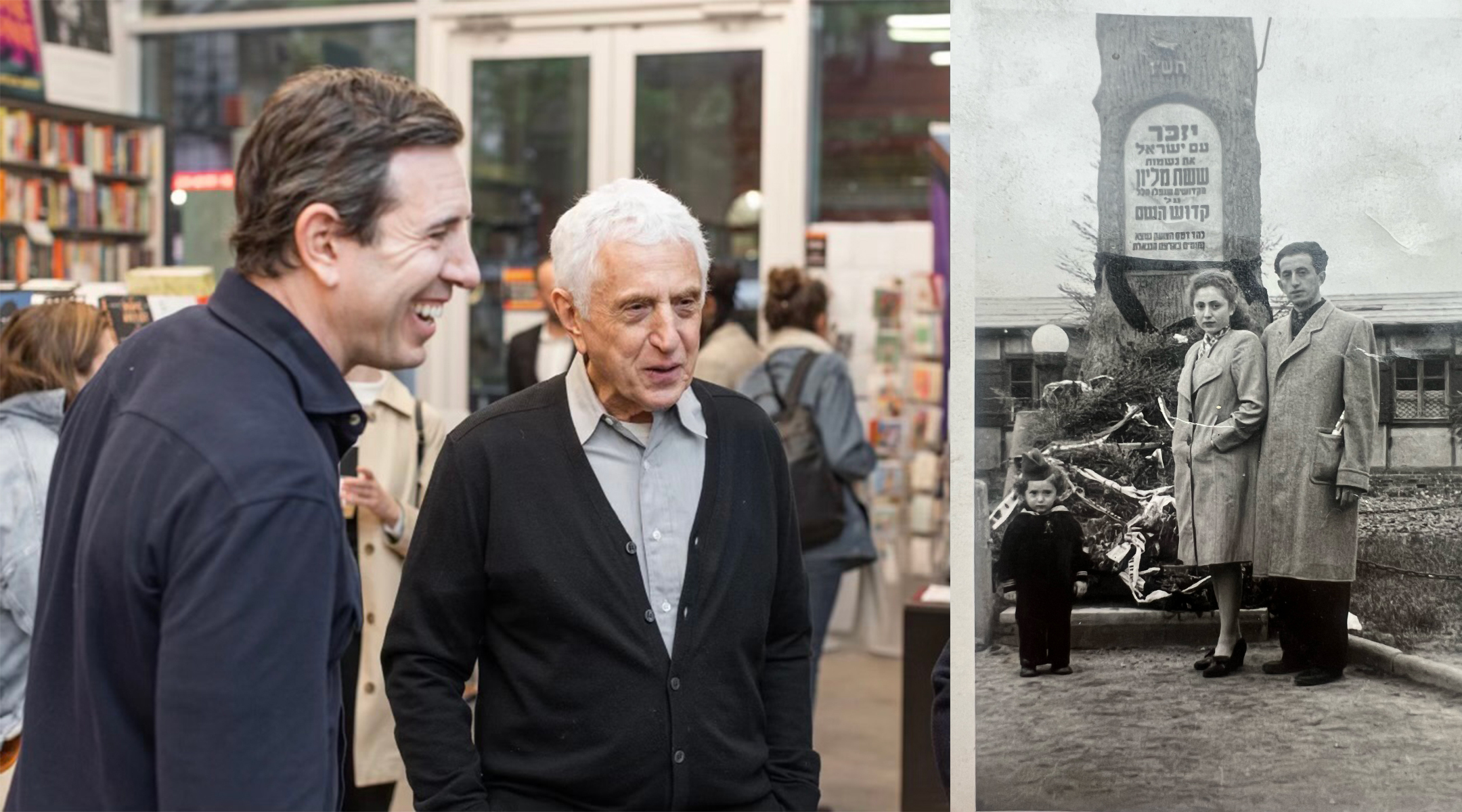(New York Jewish Week) — It’s called P&T Knitwear, but you won’t find any cardigans or scarves for sale inside this colorful shop on Orchard Street on the Lower East Side.
Instead, you’ll find a one-of-a-kind New York City-centric bookstore that’s also a coffee shop and an event space, with amphitheater-style seating for 80. Nearly every night, there are events — book talks, comedy shows, film screenings and reading groups — and there’s a podcast studio that’s available for “community use.”
Billed as a “family-owned bookstore” and named for two Holocaust survivors, P&T Knitwear is a creation of Bradley Tusk, a political strategist and prominent corporate “fixer” who is probably best-known as “the brains behind Uber’s New York City domination,” as Vanity Fair called him. Before that, he led Mayor Michael Bloomberg’s successful campaign for an unprecedented third term.
Throughout his career, Tusk, 50, who was raised in a Jewish family on Long Island, has worn many hats. A highly abridged resume: He was communications director for Sen. Chuck Schumer, worked as a special adviser for Mayor Bloomberg and served as a deputy governor of Illinois under Rod Blagojevich. (That was from 2003 to 2006 — Blagojevich, whom Tusk once described as lacking any of the real skills or work ethic to be governor, later went to prison on corruption charges.) Since earning some $100 million in equity with Uber, he’s become a venture capitalist, backing startups like online sports betting site FanDuel, as well as a philanthropist who is passionate about fighting hunger and voting by mobile phones.
The father of two teens also volunteers at a food bank every week and has written three books — a memoir, a novel about a campaign to legalize flying cars and, coming in September, “Vote With Your Phone: Why Mobile Voting Is Our Final Shot at Saving Democracy.”
“I have a short attention span,” said Tusk, by way of explanation.
As for P&T Knitwear, which Tusk opened in May 2022, “I’d always thought in the back of my head, ‘It’d be fun one day to own a bookstore,’” he told the New York Jewish Week during a wide-ranging interview inside his shop, where he sat at a small cafe table next to his 79-year-old father, Gabe Tusk.
Bradley explains that he was motivated to open P&T Knitwear when the city’s economy was still reeling from COVID and commercial real estate was available at a relative discount. He told himself, “Look, if you’re going to do something nice for New York from a retail perspective, do it now when the need really exists.”
Its unusual name honors Tusk family history: In 1952 Bradley’s grandfather, Hymie Tusk, and his business partner, Mike Pudlo, opened a clothing store on the Lower East Side by the same name. The two men were Holocaust survivors — Hymie was imprisoned in a labor camp in Siberia — and the pair became fast friends after meeting at a displaced persons camp in Germany.
The two friends eventually immigrated to New York; the Tusks made their home on Kingston Avenue in Crown Heights, Brooklyn. Over time, they opened up a small, eponymous clothing shop, P&T Knitwear, at 37½ Allen Street on the Lower East Side.
“My father’s family was in some sort of textile business — that’s what Jews did,” Gabe Tusk said. “They weren’t doctors, they weren’t lawyers, they were in the basement of businesses.”
The original P&T had a bumpy beginning: At first, the businessmen sold irregulars out of their car and then their tiny subterranean shop, filling its shelves with empty boxes in order to make their inventory look larger than it was. But through a combination of smarts, Jewish communal connections and chutzpah, the two men found success, eventually opening a bigger space on Grand Street.
After Gabe — who recalls his childhood growing up alongside the Pudlo children; the two families shared a single Plymouth station wagon — completed a stint in the U.S. Navy during the Vietnam War, he eventually joined the business, raising Bradley and his sister on Long Island with his wife.
By the late 1980s, New York City’s garment industry was in decline, due in part from the rise in imports and “the consolidation of retail,” said Gabe, mentioning Walmart in particular. “It was really hard to compete in that world.”
But wait — at one point, Walmart was one of Bradley’s corporate clients; he led the retailing giant’s ultimately unsuccessful 2010 bid to open stores within the five boroughs. Was there ever any tension between the son representing an entity that in part destroyed the family business?
Immediately, Bradley and Gabe pshaw-ed the question, insisting it was a non-issue. “As long as we’re paying the bills,” Bradley explained.

Left: Orignal P&T Knitwear co-founder Mike Pudlo with his wife, Lola Pudlo, and their first daughter, Marlene Pudlo, in an undated photo. Right: Gabe Tusk at approximately age 4 and his father, Chaim Tusk, circa 1949. (Courtesy)
For the past 11 years, Gabe has worked as CFO for Tusk Holdings. “Bradley is really good at what he does,” said Gabe, with fatherly pride. “And the things he doesn’t like to do — he doesn’t want to deal with accounts receivable, getting health insurance … he doesn’t want to deal with stuff like that.”
As for P&T Knitwear, Bradley sees the store as an outgrowth of the Gotham Book Prize, which he launched in 2021 with his friend and former Bloomberg colleague Howard Wolfson to award $50,000 annually to the best book published about New York City. “There’s sort of two New Yorks, right?” Bradley said. “For those of us who live here, there’s the physical in New York — the streets, the sidewalks and subways. But if the rest of the world New York also exists; it exists in music and movies and books and TV shows and podcasts, now, and all these other things.
“As long as that New York retains its appeal, the best and the brightest people from all over the world will want to come here,” he continued, echoing a signature Bloomberg phrase. “And if they’re coming here, New York will be OK.”
Still, Tusk, who lives in Soho, observed a lack of spaces for these “brightest and best” New Yorkers to hang when they’re not working. “The city had gotten sort of crushed by COVID from a retail perspective,” he said.
When Bradley decided to open the bookstore he’d been thinking about, he concentrated his efforts on finding a space on the Lower East Side or the East Village. He had lived in the East Village for “years and years and years,” he said, and like so many New Yorkers, still mourned the loss of the St. Mark’s Bookstore, which shuttered in 2016. “I remember that was this amazing store and it closed and nothing ever really replaced it,” he said.
When Bradley found the space at 180 Orchard St., he texted Gabe to ask him about his grandfather’s store, knowing it had been in the neighborhood. “Remind me of the name?” Bradley asked.
“P&T Knitwear,” Gabe responded. “But you can’t name a bookstore P&T Knitwear.”
Bradley, however, is not one to be told no. “On one hand, like for search engine optimization, not a good name at all, when people come here looking to buy yarn and stuff,” he added. “But it’s also a name that once you hear it, and you realize it is a bookstore, you remember it. And so for me and trying to build something that was just more than just a bookstore, once it hit me, and it got in my head, there was no talking me out of it.”
“It’s also a good story,” Gabe added. “Someone asks you, why is it [named] that? You’ve got this whole story to tell.”
“I started on third base, right? I was born in this country, safe, to a stable family that cared about education, all of the kind of typical Jewish story,” Bradley said of naming his store after his grandfather’s. “Whatever I’ve done is nothing compared to the stories … about my grandfather surviving POW camps and things like that. And so I wanted to kind of honor that legacy. This felt kind of like a cool way to do it.”

Author, publisher and podcaster Zibby Owens, center, had her New York City launch event for her novel, “Blank!” at P&T Knitwear in March 2024. (Hana Mendel)
Last month, author, publisher and podcaster Zibby Owens had her New York City launch event for her novel “Blank!” at P&T Knitwear. “I was really excited when P&T Knitwear opened, I love the event space,” Owens said, adding that she and Bradley have appeared on each other’s podcasts. “I love the history — you could sort of feel the ghosts of ancestors dancing around the aisles.”
Like the Tusks, Owens runs an independent bookstore: She opened Zibby’s Bookshop in Santa Monica, California, in February 2023. Owens said she and Bradley talked shop before she opened. His advice, she recalls, “didn’t scare me away. It made me feel like it was something I could handle,” she said. “His love of doing it was infectious and I wanted to do it, too.”
Tusk says that passion, along with respect for New York City history, is palpable at P&T Knitwear — and it connects directly with his Jewish identity, too.
“If you look at why Jews have survived for 5,700 years — despite lots of efforts to the contrary — and succeeded, it’s because there are real focuses on things like education, family, community learning. I think, in many ways, all of those things are manifesting in this store,” Bradley said, “providing all these resources for free to New York City, being a place where there’s learning and events happening almost every single night. I think a lot of the values that embody Judaism and the success of the Jewish people are things that I’ve tried to capture in the store.”
To further that point, Tusks view P&T Knitwear as “a philanthropic community resource” and not a business in the traditional sense. “We have businesses that make money, and we knew this was probably not the best way to do that,” Bradley said.
“It’s a hard business,” Bradley said of bookselling. “I don’t really know how people who actually do this for a living make a living at it. But I am lucky in that, just like mobile voting or hunger, I can take things that I care about and devote some resources to it.”
The New York Jewish Week brings you the stories behind the headlines, keeping you connected to Jewish life in New York. Help sustain the reporting you trust by donating today.





